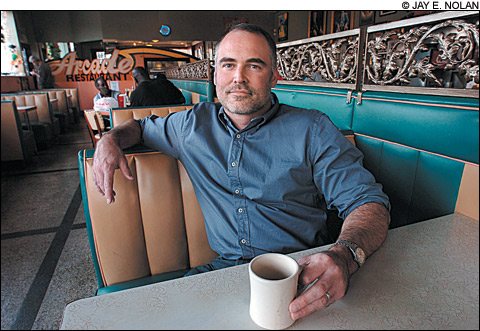
DON’T SHOOT, G-MAN! Infamous is somewhere between a joyride and a reckoning. |
| Infamous | By Ace Atkins | Putnam | 416 pages | $25.95 |
Ace Atkins’s new novel is what the movie Public Enemies should have been. In his telling of the John Dillinger saga, director Michael Mann seemed so afraid of letting some disreputable excitement into his meticulous Depression-era re-creations, you could be excused for thinking he’d given up filmmaking for embalming.You don’t venture a novel like Infamous, the (somewhat true) story of George “Machine Gun” Kelly and his hand in the botched kidnapping of Oklahoma oil magnate Charles Urschel, unless you’re willing to indulge your audience in some of the juice and flash you find in movies and legends about ’30s gangsters. The characters in Infamous, particularly Kelly and his spectacularly scheming wife, Kathryn, are a few rungs up the ladder from their hayseed backgrounds, but not yet the slick operators they fancy themselves. George in particular is an affable mug, as happy reading the funnies in his underwear as he is stepping out at a nightspot. In his marriage, he’s the turkey and Kathryn is the ax. She loves George, in her way. But you also get the feeling that the man hasn’t been born who can stymie her ambition. In the world of Infamous she’s an LMILF — the Lady Macbeth you’d like to . . .
Atkins doesn’t exactly let it rip in Infamous. A former crime reporter (he was nominated for a Pulitzer in 2001), he’s concerned with getting the story right. (Among his sources here is the reporting done on the Urschel kidnapping by papers in Kansas City, Oklahoma City, and Memphis.) That concern has characterized the three novels that preceded Infamous — retellings of the Fatty Arbuckle trial, the ’50s conflagration in the notorious Alabama sinpot Phenix City, and the 1955 murder of Tampa crime boss Charlie Wall.
But Atkins loves legend and iconography. His first four novels — featuring the blues-scholar sleuth Nick Travers — were canny tales in which death alone could not hold the spirits of Robert Johnson and James Carr from stalking the land, and in which a crazed killer, who may have been Elvis’s dead twin Jesse Garon, roamed Louisiana like a peckerwood Grim Reaper.
Infamous is somewhere between a joyride and a reckoning. You know George isn’t smart enough to avoid what’s coming. Atkins plays his good-natured criminality against the surefooted movement of the feds. And it’s there that you can feel the influence of two books Atkins admires, Elmore Leonard’s The Hot Kid and Up in Honey’s Room.
The Leonard novels read like an old master’s unsentimental return to the stories and images that obsessed him from boyhood. There’s no comparable nostalgia in Atkins’s book, but there is a shared fascination with the past. And maybe more of the past than Atkins realizes. His good guy here — Gus Jones, an agent in J. Edgar Hoover’s FBI, then beginning its consolidation of power — has a background as a Texas Ranger. When Gus takes center stage, you feel the presence of the final days of the American West, with its sense of rough justice, giving way to the bureaucratic mechanisms that will take over as the century progresses. He’s a cross between the taciturn upright Western hero and the clean-cut, straight-arrow G Man. And part of the character’s appeal is that he doesn’t quite believe in Hoover’s eagle-eyed oversight. Gus is too smart to feel he’s got anything in common with the criminals he’s after. But Atkins lets you sense their mutual respect for raising hell, and the dulling order that, like prosperity, is just around the corner.